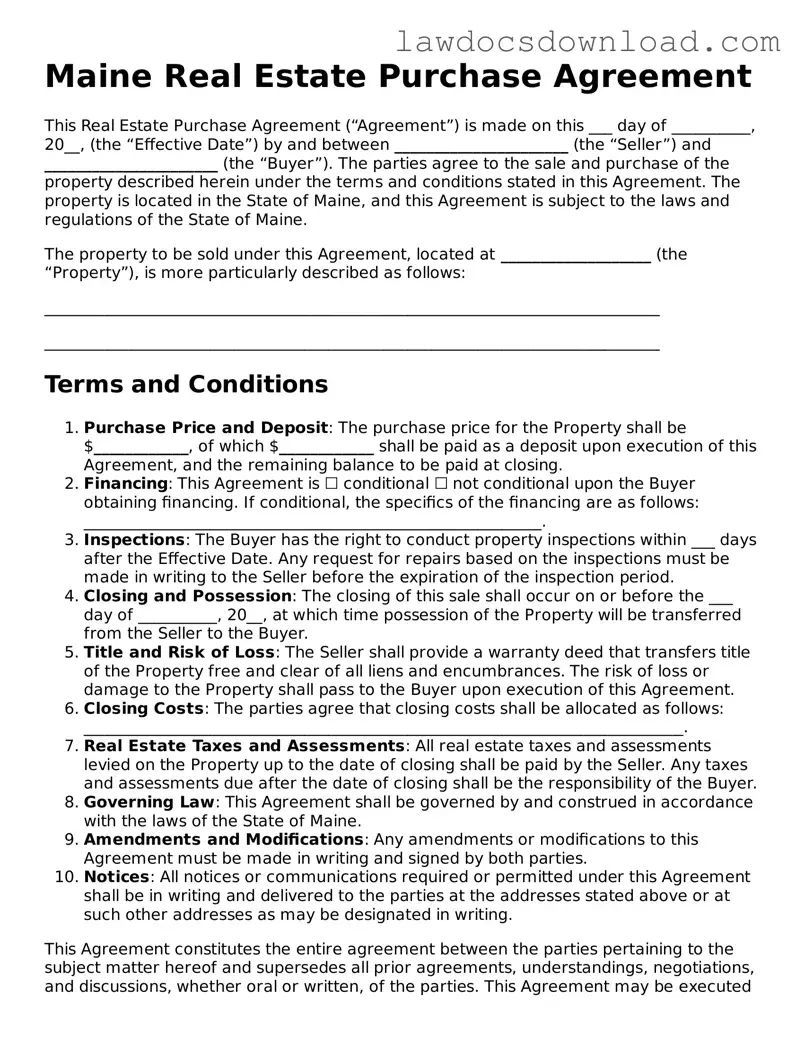The Maine Real Estate Purchase Agreement form shares similarities with the Residential Lease Agreement. Both documents outline the terms under which property is occupied, but whereas the purchase agreement details the conditions of sale, the lease agreement specifies rental terms. Both agreements include crucial details like financial terms, property descriptions, and obligations of both parties, ensuring a clear understanding of the arrangement.
Comparable to the Bill of Sale, the Real Estate Purchase Agreement also confirms a transfer of property ownership. However, the Real Estate Purchase Agreement is specific to real estate transactions, encompassing more detailed conditions such as financing, inspections, and closing terms. In contrast, the Bill of Sale is generally used for personal property and is simpler, focusing mainly on the immediate transfer of ownership without conditions related to the property's state or further obligations.
The Land Contract is another document that bears resemblance to the Maine Real Estate Purchase Agreement. Both serve to formalize the sale of real estate, but a Land Contract is a form of seller financing. It allows the buyer to pay the purchase price over time, eventually transferring full ownership when all payments are made, unlike the purchase agreement, which typically involves immediate bank financing and quicker transfer of ownership upon closing.
The Home Improvement Contract has connections to the Maine Real Estate Purchase Agreement mainly through their mutual focus on property. While the purchase agreement sets the terms for buying property, the Home Improvement Contract outlines the scope, materials, and cost of work to be done on a property. Both are legally binding agreements ensuring that the parties involved fulfill their agreed-upon obligations related to a piece of real estate.
Similar to the Option to Purchase Agreement, the Maine Real Estate Purchase Agreement offers a pathway to ownership. However, the Option to Purchase gives the buyer the right to purchase the property at a later date under specified terms, without the immediate commitment to buy. The purchase agreement, in contrast, is a direct agreement to buy the property upon agreed terms, solidifying the transaction's intent from the outset.
The Real Estate Assignment Contract is akin to the Maine Real Estate Purchase Agreement because it involves the sale and purchase of real estate. However, the Assignment Contract is used when the buyer in the original purchase agreement transfers his interest in the property to another buyer before actually taking possession. It is a way to sell the contract itself, unlike the purchase agreement, which is an agreement between the original buyer and seller for the sale of the property itself.
The Quitclaim Deed shares a common purpose with the Maine Real Estate Purchase Agreement in terms of transferring property titles. However, the Quitclaim Deed is executed without the seller guaranteeing the clear title, making it less comprehensive than the purchase agreement. While the purchase agreement includes detailed terms and conditions about the property sale, a Quitclaim Deed is more about the act of transfer itself, with minimal protections for the buyer.
Finally, the Property Disclosure Statement, while not an agreement to transfer property, complements the Maine Real Estate Purchase Agreement. Before or during the sale process, it requires the seller to disclose known issues with the property, informing the purchase agreement by ensuring that the buyer is aware of any problems. This document is crucial for transparency and reducing the risk of future disputes, highlighting the importance of honest communication in real estate transactions.

